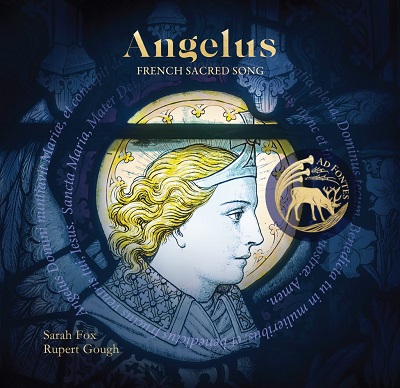This recent compilation for solo voice, harp and organ is a delightful tour d’horizon of songs referencing the Virgin Mary, with works written by those associated with the French organist-composer tradition and others working within the shadow of Debussy and Messiaen. Together, they form a distinctive Gallic presence and sensibility. The disc’s title refers to the daily ritual of praying the Angelus, a centuries-old devotional prayer, here given musical life in niche repertoire seldom heard beyond the parameters of church performance. Variously lyrical and meditative, and imbued with bell-like sounds often hidden in the accompaniments, this collection is considerably enhanced by the warm acoustic of Buckfast Abbey and its splendid Fratelli Ruffatti organ, an Italian built instrument modelled on the French Romantic tradition, the whole atmospherically captured by the Ad Fontes engineers.
If there’s an unmistakable whiff of incense and candlelit intimacy, there’s no small measure of harmonic sensuousness, nowhere more apparent than in the music of Langlais and Messiaen. Then there’s the radiance of soprano Sarah Fox whose seductive tone brings a sense of child-like wonder to the soaring phrases of Henri Büsser’s Le sommeil de l’enfant Jésus. This Nativity scene – subtitled ‘A lullaby for Christmas Eve’ – unfolds with a transcending lyricism and bears echoes of O Holy Night by Adolphe Adam. Like that work, it belongs to a style of Christmas chamber music popular during the latter half of the 19th century.

One of the earliest songs of veneration here is by Büsser’s teacher, César Franck, whose Panis Angelicus was originally conceived (for solo tenor) for inclusion in a revision of his orchestral Mass in A major. For this recording, the 1872 version has been reworked for soprano harp and organ, with the organ also taking the part of the solo cello. Arguably, it’s the most familiar piece on the disc, although Messiaen’s O Sacrum convivium (his only choral work written for the church) will be well-known for its a cappella SATB version. Nothing is lost in this exquisite setting for soprano and organ. According to Rupert Gough’s excellent booklet notes, it was likely to be first sung in this form at the Église de la Sainte-Trinité in 1937. Here, its stillness and mysticism are beautifully captured.
Like Messiaen, Langlais’s music is strikingly individual, and of his numerous contributions to church music his Messe Solennelle is probably his most performed work, at least in the UK. This disc provides a fascinating window on two pieces for soprano and organ – Ave Maria and O salutaris, one of beguiling simplicity (though not without drama), the other startling for its searching lines that seem to grope towards salvation yet are constantly waylaid by the ‘hostile wars’ within the text. As a wartime work (1943), its sense of unease is readily apparent.
A not dissimilar sense of unrest permeates Lili Boulanger’s Pie Jesu where circling figures within the organ part add to its disquiet, a repetitive motif possibly influenced by the knowledge of her terminal condition linked to Crohn’s disease to which she succumbed aged just twenty-four. On a lower level of inspiration is the four-square setting of Lux aeterna by her older sister Nadia. Interestingly, both works are sung each year at the Église de la Sainte-Trinité on 15th March as a memorial. In recent years the work of Lili Boulanger has been much unearthed, and she is now a composer more frequently performed than André Caplet (known primarily through his orchestrations of works by Debussy) and the severely self-critical Jean Roger-Ducasse, a star pupil of Gabriel Fauré, whose liturgical works have only occasional outings. It’s good to be reminded of Caplet and Roger-Ducasse, their respective contributions, alongside one by Ernest Chausson, adding a further layer of Gallic charm.
Most of the disc comprises liturgical miniatures, but Louis Vierne’s Les Angelus and Flor Peeters’ four-part Speculum vitae are more expansive settings. Vierne’s triptyque celebrating the Virgin Mary sets three poems by Jehan le Povre Moyne and begins with a bell-like accompaniment in ‘Au matin’ which later underpins the soprano’s ecstatic rhapsodising. The more animated central panel, ‘A midi’ inhabits a toccata-like part organ part evoking ‘le brut de cité et des foules’ (the noise of the city and the crowds), while ‘Au soir’ returns to the numinous mood of the opening. Setting Flemish words (originally) by Jozef Simons, Speculum vitae (Mirror of Life) charts the progress of the day. Sarah Fox responds to the English translation with a wonderful fervour, pointing up its pictorial text and the music’s shapely phrases. It’s a handsomely crafted spiritual tone poem from 1935, variously noble, poignant and anchored by richly perfumed harmonies.
In conclusion, this is a marvellous treasury of French sacred music to which Rupert Gough, Sarah Fox and Cecily Beer collaborate with a wonderfully intuitive sensitivity, bringing to each song (and two solo organ pieces) a demonstrable affection. Full texts, organ specifications and full colour images, along with the aforementioned notes, are all impressively packaged. This exceptional disc is not to be missed!
David Truslove
Sarah Fox (soprano), Rupert Gough (organ), Cecily Beer (harp)
Louis Vierne – Les Angelus Op.57, César Franck – Panis Angelicus, Jean Roger-Ducasse – Ave Regina caelorum & Salve Regina, Henri Büsser – Le sommeil de l’enfant Jésus, Ernest Chausson – Pater noster, Louis Vierne – À l’Angélus du soir, Jean Langlais – Ave Maria & O salutaris, Olivier Messiaen – O sacrum convivium, Jean Langlais – Angélus (Huit chants de Bretagne, Op. 161), André Caplet – Pater noster, Lili Boulanger – Pie Jesu, Nadia Boulanger – Lux aeterna, Flor Peeters – Speculum vitae, Op. 57.
Ad Fontes ADF009 [69:58]